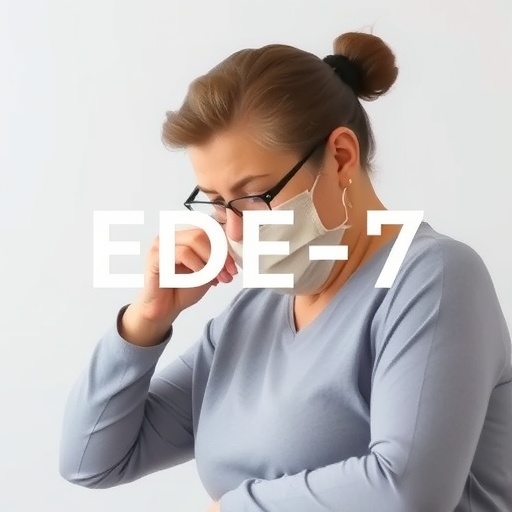In recent years, the growing concern surrounding eating disorders has captured the attention of researchers worldwide. The Spanish version of the Brief Eating Disorder Examination Questionnaire (EDE-Q7) marks a significant advancement in the psychological assessment of these disorders within Spanish-speaking populations. This innovative assessment tool is tailored to better understand the nuances of eating disorders, which continue to affect a significant portion of the global population. By refining its psychometric properties and dimensional structures, the EDE-Q7 can provide essential insights into the prevalence, characteristics, and gender differences in eating disorders among adults.
Eating disorders such as anorexia nervosa, bulimia nervosa, and binge-eating disorder vary significantly across different cultures and populations. The presence of culturally relevant tools to diagnose and assess these disorders is critical for effective treatment and intervention. As the field of eating disorders research evolves, it is essential to ensure that assessment measures are both valid and reliable, accommodating the diverse experiences of individuals from different backgrounds. The EDE-Q7 serves this purpose as it is specifically designed with the Spanish-speaking population in mind, addressing the unique socio-cultural factors that may influence eating behaviors and attitudes toward body image.
The researchers Peláez-Fernández, Sánchez-Álvarez, and Mills, along with their co-authors, embarked on an extensive study to evaluate the psychometric properties of the EDE-Q7. This study assessed dimensions such as reliability, factorial validity, and the overall structure of the questionnaire, providing evidence to support its use as a valid measurement tool within a Spanish adult sample. These aspects are fundamental to ensuring that the questionnaire accurately reflects the underlying constructs it aims to measure, which include eating behaviors, attitudes, and psychological features associated with eating disorders.
Reliability is a cornerstone of any psychological assessment tool, ensuring that the instrument yields consistent results over time and across different populations. The researchers utilized rigorous statistical analyses to assess internal consistency and test-retest reliability. The findings indicated that the EDE-Q7 demonstrated strong reliability metrics, suggesting that the tool is dependable for researchers and clinicians when evaluating individuals for potential eating disorders.
Meanwhile, factorial validity assesses whether the questionnaire accurately captures the theoretical constructs related to eating disorders. Through an exploratory factor analysis, the researchers were able to distill the EDE-Q7 into its core dimensions. This process revealed a multidimensional structure that aligns with the existing psychometric models used in eating disorder research. Each factor reflects specific aspects of eating attitudes and behaviors, from cognitive distortions about food and body image to behavioral indicators of disordered eating patterns.
Furthermore, the study focused on examining sex invariance in the EDE-Q7. This dimension is vital for understanding how eating disorders manifest differently among men and women. Historically, research in this area has been predominantly female-centric, leading to an incomplete picture of how eating disorders affect people of all genders. The results demonstrated that the EDE-Q7 maintains its measurement invariance across sexes, allowing practitioners to confidently utilize the tool while considering the unique experiences of both male and female clients.
The implications of these findings extend beyond academic interest; they carry real-world significance for public health initiatives and clinical practice. With an effective assessment tool available for the Spanish-speaking community, clinical practitioners can more accurately identify and diagnose eating disorders, paving the way for tailored interventions that address the specific needs of this population. Early and accurate detection can significantly enhance treatment outcomes, reducing the long-term health consequences associated with eating disorders.
Moreover, health policies aiming to improve mental health services for eating disorders can be informed by the data derived from the application of the EDE-Q7. As professionals in healthcare work to develop programs that engage individuals at risk, having access to culturally relevant assessment tools empowers these initiatives. By mobilizing resources effectively, public health organizations can work toward reducing stigma and fostering a supportive environment for those affected by eating disorders.
In a world where mental health issues are increasingly recognized as paramount concerns, effective research tools like the EDE-Q7 serve a critical role in shaping interventions and support systems for individuals grappling with eating disorders. The Spanish version of this questionnaire, with validated psychometric properties and a clear understanding of sex differences, represents a pioneering step toward delivering inclusive and effective mental health care.
The significance of the EDE-Q7 lies not only in its statistical robustness but also in its potential to bridge gaps in medical care and support for Spanish-speaking communities, where language and cultural nuances often hinder access to appropriate resources. As researchers continue to refine their understanding of eating disorders through innovative tools, the hope is to foster a more informed dialogue around diagnosis and treatment that transcends language barriers and cultural contexts.
In conclusion, the Spanish version of the Brief Eating Disorder Examination Questionnaire (EDE-Q7) stands as a beacon of progress within the realm of eating disorder research and assessment. As psychologists, researchers, and healthcare professionals continue to explore the intricacies of eating behaviors across diverse populations, tools like the EDE-Q7 will undoubtedly play a vital role in elevating the discourse, enhancing understanding, and ultimately leading to healthier lives for countless individuals.
Subject of Research: Eating Disorder Examination Questionnaire (EDE-Q7) and its psychometric evaluation in a Spanish adult sample.
Article Title: Spanish version of the brief Eating Disorder Examination Questionnaire (EDE-Q7): psychometric properties, dimensional structure, and sex invariance in a Spanish adult sample.
Article References:
Peláez-Fernández, M.A., Sánchez-Álvarez, N., Mills, J.S. et al. Spanish version of the brief Eating Disorder Examination Questionnaire (EDE-Q7): psychometric properties, dimensional structure, and sex invariance in a Spanish adult sample.
J Eat Disord 13, 165 (2025). https://doi.org/10.1186/s40337-025-01354-3
Image Credits: AI Generated
DOI:
Keywords: Eating Disorders, Psychometrics, EDE-Q7, Spanish-speaking population, Assessments, Reliability, Validity, Sex Invariance.
Tags: anorexia nervosa evaluationbinge-eating disorder researchbulimia nervosa diagnosiscultural factors in eating disordersEating disorder assessment toolseating disorder prevalence among adultsEDE-Q7gender differences in eating disorderspsychometric properties of assessmentssocio-cultural influences on body imageSpanish-speaking populationsvalidity and reliability in psychology





